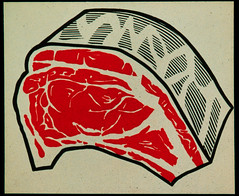I brewed a Belgian Abbey Dubbel today, which is one of my favorite styles of beer and also one of the most aggravating to try to make at home. Dubbel comes out of the monastic brewing tradition in Belgium and was invented at the Westmalle Brewery, one of the six Trappist monasteries that brew beer. The most famous Abbey styles are Dubbel and Tripel (Double and Triple) and were both invented at Westmalle. The Westmalle Tripel is a classic and, for my tastes, the absolute pinnacle of what Tripel should be. The Dubbel is also a classic and very good, but I actually prefer Affligem, which I think is a little richer and maltier. In any event, I would never turn down a bottle of Westmalle Dubbel.
Dubble is an amber-brown beer that’s generally around 6.5-8% alcohol and has a rich malty flavor, subdued hop bitterness and flavor, and generally has dark, dried fruit favors like raisin and prune from the use of dark crystal malts. The beers have wonderfully, complex aromas of dried fruit, spice, dark sugar, and spice. They have a deep, rich malt flavors intertwined with fruit and spice. Unlike other rich, dark beers, like Old Ales, Dubbles actually finish fairly dry, which is what makes them so dastardly hard to brew. A great Dubbel balances rich malt and complex flavors with a dry, but lingering finish. The secret to producing the style is to use enough richer malts, like Munich and some Belgian Special B (a dark crystal malt that helps to create the dried fruit flavors) and also to use some sugar to help boost the alcohol and to dry the beer out.
Some people find it difficult to imagine that sugar actually dries a beer out, but the science behind it is fairly simple. Plain sugar is 100% fermentable by brewers yeast. Corn sugar, candi sugar and even regular table sugar, are simple sugars and brewers yeast can eat and ferment all of them completely. The sugars produced by mashing malted barley and much more varied and some of them are complex types of sugar which yeast can’t ferment. The typical mash made from100% malted barley is about 75-85% fermentable by the yeast, and as a result 15-25% of the sugar is left over in the finished beer, which is what gives beer it’s richness and sweetness. To make higher alcohol beer, you normally use more barley to extract more sugar, and if 15-25% of the sugar is left in the finished beer, then the more barley, the more leftover sugar, and the sweeter the beer. If you make a high alcohol beer and use sugar and malt, you increase the amount of sugar in the wort, but the percentage of residual sugar in the beer is lower, because you started with a higher percentage of fermentable types of sugar. The use of sugar is what makes a 9% alcohol Belgian Tripel a drier beer than a 9% alcohol barley wine, which is typically brewed from all malt.
This Dubbel will be on the lighter end of the scale, more around 6.5%. I’m using the White Labs Abbey IV yeast (WLP540), which I believe is cultured from Rochefort. If it is a Rochefort derivative, like Wyeast’s 1762 Abbey II, then it normally requires higher temperatures to get the characteristic Rochefort fruitiness. Luckily it’s fairly warm, so we’ll see how this one goes. The grain bill was roughly 50% pils, 15% Vienna malt, 15% Munich malt, 10% Special B malt, and 10% corn sugar. The hops are Palisades for bittering and a small amount of Saaz in the finish for a little extra spice.
I brewed a batch two weeks ago with this yeast in order to help prop up the yeast. The first beer is what I’ve decided to call a Belgian Summer Ale (since so many Belgian beers generally don’t fit any real style, you’re free to call it what you want). The Summer Ale was 80% pilsner malt and 20% wheat and was rather aggressively hopped for a Belgian style beer. It uses Palisades hops throughout, which are slightly spicy, and are derived from an open pollinated Swiss variety of Tettnanger. It’s about 5% which is fairly mild for Belgian beer, but it’s crisp, spicy, and light which makes it a perfect summer quaffer. It was kegged today so I’ll be drinking it in a few days.
I’ll report back on this beer when it’s ready in about 2-3 weeks. In the mean time, I should try and track down and bottle of Westmalle or Affligem for research.
Saturday, July 14, 2007
Brewing Belgian Dubbel
Posted by
Bill
at
2:44 PM
![]()
![]()
Labels: abbey ale, abbey beer, affligem, trappist ale, westmalle dubbel
Subscribe to:
Post Comments (Atom)

1 comment:
Absolutely incredible brew-blogging.
Post a Comment